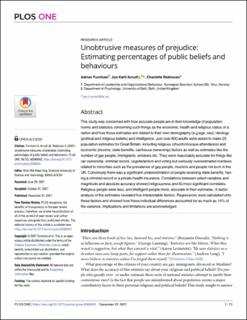| dc.description.abstract | This study was concerned with how accurate people are in their knowledge of population norms and statistics concerning such things as the economic, health and religious status of a nation and how those estimates are related to their own demography (e.g age, sex), ideology (political and religious beliefs) and intelligence. Just over 600 adults were asked to make 25 population estimates for Great Britain, including religious (church/mosque attendance) and economic (income, state benefits, car/house ownership) factors as well as estimates like the number of gay people, immigrants, smokers etc. They were reasonably accurate for things like car ownership, criminal record, vegetarianism and voting but seriously overestimated numbers related to minorities such as the prevalence of gay people, muslims and people not born in the UK. Conversely there was a significant underestimation of people receiving state benefits, having a criminal record or a private health insurance. Correlations between select variables and magnitude and absolute accuracy showed religiousness and IQ most significant correlates. Religious people were less, and intelligent people more, accurate in their estimates. A factor analysis of the estimates revealed five interpretable factors. Regressions were calculated onto these factors and showed how these individual differences accounted for as much as 14% of the variance. Implications and limitations are acknowledged. | en_US |

